Welcome back to DDLJ watch! If this post gets decent views, I might try to do at least one of these posts a week, add it to the rotation on Wednesdays and/or Saturdays when I don’t have anything else. And if I ever finish DDLJ, I will move on to HAHK or Sholay or another one of the classics. But only if I get the views! So COMMENT!!! It lets me know you are reading, and gets more people to read them. The lack of comments/readers is why I kind of let this die last summer. (last post here, you can go back in time from there).
In the last section, I talked about Kajol’s painful return to her home. She originally found herself happy to retreat to the warm light of the home, but in the end she could not, literally could not, shut the door on her visions of Shahrukh. And she was forced to confess her feelings to her mother in the holy light of the family hearth. Only to be blasphemed by Amrish arriving to stomp on her dreams and leave her in misery.
At which point we cut to Shahrukh, in the opposite situation in every way. Not just opposite, but curative. Like taking pepto-bismal to provide base for the acid in your stomach and put your PH back in balance (I think all the pink in the background is affecting my metaphors).
And now Shahrukh will have that same confession conversation with his parent, but it will be in a uniquely different way. As represented by the replacement of Kajol and Farida’s fire, with cans of Stroh’s beer. Although, beer does have an equally ancient connection as fire. I’m thinking of mead halls in Beowulf and so on. I could take this a bit further and argue that Shahrukh and Anupam are showing how they have embraced the ancient European traditions instead of Indian, but I don’t want to go that far. Instead, I will just leave it that men drink together and women gather around the hearth. And that drinking British beer in cans is a sign that they have found a way to bond together away from their home country, and without any woman to help tie them together.
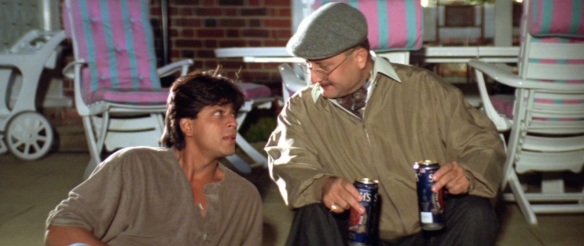
It’s not just that are sitting outside with beers instead of inside a home around a fire which marks them as men. It is the way they are talking. The conversation is just so different from how Kajol and Farida talked. It shows both the difference in social positions between a man and a woman, and the difference in basic behavior, the different way of communicating.
Firstly the difference in communicating. Women like to talk about their feelings, to give the whole story of where things came from, how they reached their decisions. That is how Kajol talks to her mother, in one long story start to finish, trying to pass on the whole emotional journey she went through. But Shahrukh, he doesn’t want to talk at all. And when he is surprised into a confession, the whole story is in just one word.
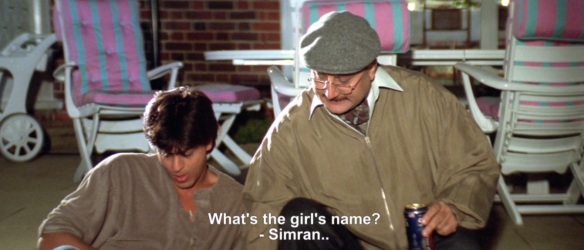
The way Shahrukh and Kajol talk to their parents about their relationship shows their different attitudes in the same way that their behavior throughout their time together showed it. Kajol was always fighting against herself, finding her way through to her own emotions, and almost afraid to admit them. Shahrukh was reluctant in a different way, not because he was afraid of his emotions, but because he was afraid of what he would have to do if he admitted them. As a man, the responsibility is his. The decisions are his. If he admits his feelings, it’s not just a matter of admitting them, it means fighting against all the world on her behalf, turning over the whole of society, going to battle essentially.
And Anupam, as both the father of this particular very responsible boy, and a fellow man, he gets that. The admission must immediately be followed by action. And so his next question is a strategic one, already considering next steps and planning.
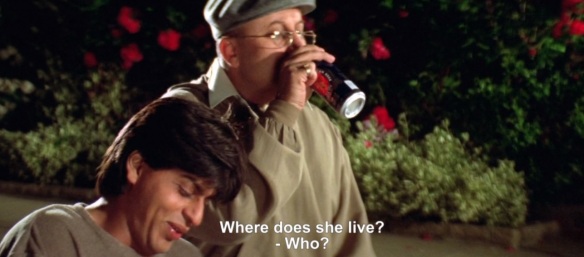
Shahrukh understands the message of that question. It’s not just random. It’s a “field of battle” kind of question. Anupam is ready to go to the house and propose to the family, or plan an elopement, or whatever else. And the first step is to find out where Kajol is at the moment.
And so Shahrukh doesn’t answer that question directly, instead he gives the necessary background. Not the whole emotional journey that Kajol gave her mother, but rather the basics, that Kajol is engaged to be married, and so all these plans are not necessarily going to come into play. Or, alternatively, that it will not be the simple matter Anupam might assume if they decide to go into battle, it will be a real fight.
And Anupam changes tactics, going back to the beginning, asking what Kajol is like, trying to remind and confirm for Shahrukh that he really does want her, she isn’t just another girl to him. I only caught on this watch, when I was listening closely, that Shahrukh’s exact description, the first thing that comes to mind when he thinks of Kajol, is “bohut pyari” (very lovable). It’s not beautiful, as it would be in almost any other movie, it’s lovable. And not “lovable” like “oo romantic love”, but “pyari”, like you would use for a wife or a child or a grandmother. It’s not that Kajol is easy for him to love, it’s that Kajol would be easy for anyone to love. It’s a personality trait, if you see what I mean. He isn’t saying that he is in love with her, he is saying that the first description that would come to mind for anybody asked to describe Kajol is “lovable”. He is smiling as he says it, not because he is thinking of how much he loves her, but because he is thinking of all the little things she does that would make anyone love her.
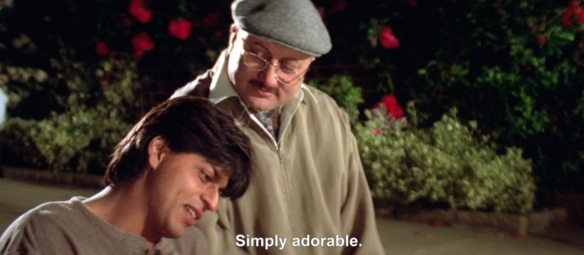
But they don’t linger on a description of why or how he loves her, the conversation quickly moves back to an “action!” level. Because men don’t like/need to talk about emotions, and because, as men, the emotions lead to an immediate responsibility for action. And that is why Shahrukh addresses it immediately, letting his father know that just because he loves Kajol, it doesn’t mean he is ready to do anything about it, or that he should do anything about it. And, at the same time, gives us the thesis statement for the film! He knows that Anupam is pushing for an elopement, a dramatic romantic gesture. But Shahrukh is holding back, because times have changed.
That was the movie that Adi wanted to make, one in which the drama of the old school love stories was replaced by something new. And Shahrukh is also correct, times have changed. He and Kajol were allowed to spend lots of time together, and at any point Kajol could have confessed her love, could have asked him to help her break her engagement. This isn’t the “old days”, when you had to look for a flick of the eye or a secret message, and then respond by storming the castle. No, the new age right thing to do is to sit and look at the moon and respect her decisions.
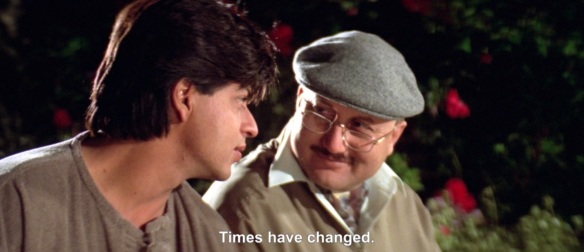
But, is that correct? Anupum’s response, which the subtitles messed up a little, is “Love today is still love”. That’s the bottomline. Maybe the situations and rights and freedoms and so on have changed in today’s world. But Shahrukh is still in love, that hasn’t changed. And so, he should do something about it. The thing he does may be different, but he has to do SOMETHING!
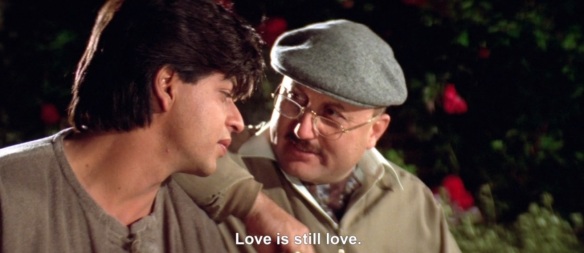
That’s Anupum’s closing. The steps from A to B may be different, but the end goal is still the same. He has to bring his bride home with him, doesn’t matter how he does it. Also, while Shahrukh is being all soft and cautious about it, ultimately the two of them are still talking about the exact same thing that has been happening since forever. They want him to go and get the girl from the other tribe/family, and bring her back to join theirs. And in that same ancient level of things, as the head of their “tribe”, Anupum is giving Shahrukh his blessing, and an offer to welcome Kajol into their group.
Amrish Puri’s response in the last section is the more obviously kind of tribal and basic, declaring that his daughter is his possession, that for her to fall in love and think for herself is a “sin”. But Anupum and Shahrukh are talking on the same kind of level, about fighting for a woman and bringing her back to their group. And I don’t find this objectionable. I find it kind of accurate.
When you are talking about something as emotional as marriage, it does get to be kind of tribal like that. And there’s really no way around it. The part that matters is what comes before the tribal ancient part clicks on in your brain. Amrish doesn’t think, at all, ever. He just gives in to this side of things. Compare him with Alia’s father in Humpty Sharma’s DDLJ remix. He is even more angry and protective than Amrish. But he thinks about his methods and considers all sides of things before acting. He doesn’t just go “daughter wants to leave, must destroy daughter!”, be works through “this boy doesn’t look like much, it’s a risk to let her leave, the boy I’ve picked out is better and she was okay with him until just now, I will test this new boy by throwing him out and see if he comes back.” Anupum and Shahrukh are working through that here, is Shahrukh really in love with her, is it worth trying their utmost? He is and it is? Okay, then we drop into our baser instincts and just go out and get her.
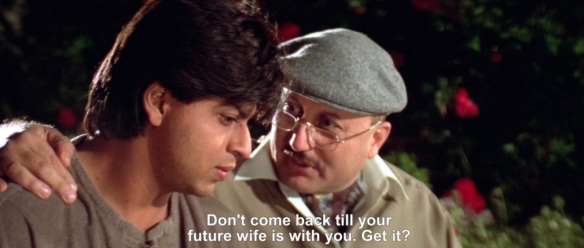
“Get her”, but in a new age way. Anupum doesn’t go over to present a proposal, Shahrukh doesn’t sneak up her balcony in the middle of the night. Shahrukh goes over by himself to knock on the door and ask to speak to Kajol. It would have been fun to see that conversation, wouldn’t it? If this were a 90 minute movie, that would be the end of it. Shahrukh knocks on the door and asks Farida if he can speak to Kajol. He and Kajol awkwardly sit in the backyard with Farida and Pooja Ruperal watching through the window as chaperones. After some shyness, Kajol blurts out her feelings. Shahrukh is thrown by the bluntness, but manages to pull himself together and admit he feels the same way. They go inside holding hands, Farida gives them her blessing, and suggests that Shahrukh and Anupum come back that night to present a formal proposal. That’s what Shahrukh is expecting here, to talk to Kajol, meet her family, convince her that she should agree to marry him and break her engagement, and then work on next steps to make that happen. He looks eager and nervous, but not scared or sad. He isn’t ready for some huge battle, because “times are different”, he doesn’t think that will happen.
Of course, this is also his male privilege. Shahrukh doesn’t think there will be a big drama, because he hasn’t seen that some fathers still think they have total control of their daughters. Kajol knew it, so did Farida, they knew they were in trouble as soon as Amrish came into the room. But the abuse they suffered was kept within their home, to the outside world they seemed just as free and modern as ever, as though women had been moving forward just like men had. Kajol wore modern clothing, went to school, walked around with friends. But inside the home, she was terrorized. And she carried that terror with her, like she says, she always remembers that she is “Baldev Singh’s daughter”. That’s why she resists flirting with Shahrukh on the trip, why she resists everything in life, because she has internalized that abuse. And that is why she is so apparently “free”, Amrish trusts that his power over her will carry through, no matter where she goes in the world.
But Shahrukh hasn’t quite grasped that yet, which is why he is so adorably happy and nervous as he approaches her door. And tucks in his shirt, which is SO CUTE! That he is trying to look like a “nice boy” for her family.
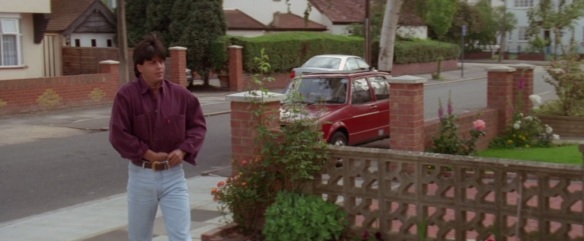
My last section was all about doors and portals. Kajol went through this door, but then found herself unable to fully close it, to see Shahrukh beckoning to her outside. Now, Shahrukh is here, just as she imagined him, but the door is closed. They are separated not just by space, but time, she was there last night and here is there this morning.

But Kajol has managed to leave one small trace behind, the door Shahrukh was expecting is closed, but another has been left open. There are a lot of reasons to use this bell as a love symbol, but in this particular moment, it is a “doorbell”, a little visual pun, a bell that is a reminder that the door will open if he just rings it.
It’s also, as I said in the section before last (10 months ago!) a symbol of Kajol’s heart. She had it, he carried it for a while, he gave it back to her, she realized it wasn’t even hers any more, and now has left it behind for him. This was Shahrukh’s hesitance last night, this is what he needed from coming to see her today, the “green light” to put all his manly power to use and go get her. He was expecting to just speak with her, to see how she responded and get a firm commitment. But this works too, the bell tells him that he should give in to his basic instincts and drag her back by her hair to his cave, as it were.
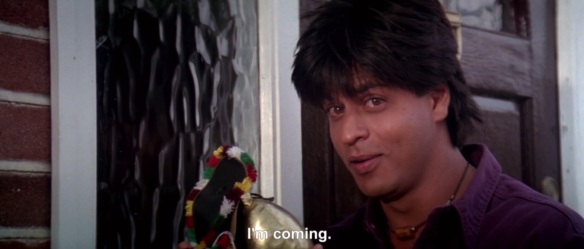

I love the last screen shot!!! And all the rest of your commentary. Can you say something about Anupam Kher’s awesome costuming?
LikeLike
Oh I am sure I will get to Anupam’s costumes eventually!
LikeLike
always good to read about DDLJ- thank you for writing about this again!
LikeLike
Thanks for commenting!
LikeLike
Kajol was “terrorized” and “abused”? Good grief. “Controlled”, I’ll buy, and only in the sense of having to conform to expected norms. This is very volatile language. Having worked with actual victims of abuse and terror, I’m always wary of overstating the issue for dramatic effect, as it ultimately robs the sufferers of real abuse and terror of the sympathy and support they deserve, if they are put in the same category as Simran here.
LikeLike
I’m using this language on purpose, to make people be aware of what issues these films are addressing. They aren’t “just” love stories. If you say “it’s a romance about a boy and a girl and her father objects to their love story”, it sounds flimsy and easy to dismiss. If you say “it’s a movie about honor killings”, that sounds serious.
DDLJ treats this all with a very light touch. And you are right, we never see physical abuse. And Amrish is just asking her to conform to “expected norms”. But those norms are for a teenage girl to be ripped from everything she knows and married to a stranger. And if she dares to ever think or desire something for herself, her father reacts with insane fury. This is not okay. This is not a good “expected norm” to have. And I want to use language to points that out, that makes people stop and think and go “wait, no, this is truly terrible what is happening here. She should have the right to fall in love, to put off her marriage, to talk to her mother about her feelings, without being made to feel that she has committed a terrible sin.”
It’s not so much that Amrish is actually physically abusive, but that he indicates he would not see anything wrong with that. It is his mental stance, which he has passed on to his family. He is in control of everything. Kajol is legally an adult, there is no reason for her to marry against her will. But it never occurs to her to argue back. It never occurs to Farida either. If Amrish had chosen to kill Kajol, Farida would have been sad, but I don’t know that she would have felt able to argue back.
That’s what this film, and others, are showing. The underlying social assumptions which lead to the honor killings and other abuses. And making us question those underlying assumptions.
LikeLiked by 1 person
I don’t disagree that there’s more to the film (in one sense) than a “mere” romance as it’s understood in Hollywood films. But still your language is disproportionate, and in my view, disrespectful to people who really suffer from abuse (including emotional abuse) and terrorization. And it’s a completely untenable stretch to try to link it to honor killings, of which there is not even a whiff here.
I know you like to try to find the “deeper/underlying social issues” in films, but do realize that the environment in which the film is set, meaning, the cultural assumptions that it doesn’t spell out, as they will be familiar to its audience, is not automatically the theme of the film, or even “what it’s about.” So here, what you have is a father who wants to protect his daughters from the “corrupt” environment in which he’s forced to bring them up, and he wants to do this by clinging to the traditions of his country of origin. I’ll actually even withdraw that “controlled” charge. Simran has been shown throughout to have been raised in a loving home, with a loving mother *and* father. The family is well aware of his antipathy towards western culture — that’s why they stop playing the radio when he’s coming home, for example. But they treat it more as an eccentric foible on his part rather than any threat to their freedom or happiness. But note that this antipathy is not a gender biased one. He’s just as disapproving (or more) about Raj and his friends because they’re rude (do not respect elders as per Indian culture), knock over his statue of Lakshmi (no respect for religion) and drink alcohol. So what he is objecting to is their lack of “Indian culture/values.” His objection to Simran wanting to marry Raj is not so much that she made this decision on her own, but that she is breaking his promise about her engagement — a loss of honor for him and the family — and it’s an engagement she has long known about and did not object to, even if she wasn’t the one who made that match. So she is also breaking her word by going out with another guy when she knows she’s engaged to someone else. We have no evidence of even emotional abuse or manipulation — her engagement is out in the open and she knows about it — nor of coercion. Yes, she’s an adult, so she could have refused to get on the plane to India. She didn’t do so. She could have run away from the family home once they get to Punjab. She didn’t do so. Part of the reason she didn’t do either of those things is that she has no clue if Raj even has any serious intentions toward her. So that is a romantic problem that has to be resolved.
Just contrast Simran’s situation with that of Jazz in Namaste London — she wasn’t told why she was going to India (she thought it was a vacation), she wasn’t even told she was getting married (just taking part in some funky ceremony), and she had never heard of or agreed to that particular groom. Even though this film, too, is a “romantic comedy”, it does much more clearly and explicitly treat the problem of British girls of Indian origin who are tricked into marriage “back home”, which again is a real issue in the UK. Once Jazz does find out she has been married, she protests vociferously, and immediately goes back to Britain. Comparing the two cases, you see that none of that is true with Simran. This is why I object to your characterizing her situation and the film with excessively melodramatic (and misleading) terminology.
LikeLike
This reminds me of Pardes. Alok Nath was very good father, much nicer than Amrish Puri in DDLJ. Mahima was the apple of his eye, but he didn’t wait even a minute to threaten her with sword (or knife, don’t remember well) when he has heard that she misbehaved.
I didn’t work with victims of abuse, but I think that there are different shades of ill-treatment. What was happening in Kajol’s house wasn’t normal. She wasn’t even asked if she want this arranged marriage. Her mother couldn’t say a word to help her. Is not that he only wanted her daughter to “conform to expected norms”. He wanted to be the owner of her life, and it’s not ok.
LikeLike
I was also thinking of Pardes! It started very similarly, the father picking his daughter’s husband and talking about her virtue and so on, but otherwise seeming like a “normal” father. But that underlying assumption that he had the right to control her life exploded into violence once she tried to break it. And no one really tried to stop him, because the whole family also accepted that he had the right to do what he wanted with his daughter (except his own mother, if I am remembering correctly, who tried to talk sense into him).
I like you description “what was happening in Kajol’s house wasn’t normal.” That’s what surprised Shahrukh here, he was picturing a “normal” house, where he could tuck in his shirt and brush his hair and convince her family that he was responsible and then they could get married. He wasn’t ready for a household where her father would have sold up and moved at the possibility of his daughter thinking for herself.
LikeLiked by 1 person
My daughter and I watched Zamaana Deewana again yesterday. The part at the end floors me every time I watch it. Yes, we’ve just married you to this asshole you didn’t really want to marry but did so anyway TO KEEP HIS EVIL FATHER FROM KILLING HER MOTHER WHO HAD BEEN HELD CAPTIVE FOR 15 YEARS. So sorry! But, it would be a sin for you to divorce for another man! You will dishonor our name! EVERYONE AT THE FREAKING WEDDING INCLUDING NO-LONGER-CAPTIVE-MOM IS IN AGREEMENT WITH THIS! I get cultural differences, but are these people COMPLETELY INSANE?!? JUST BATSHIT CRAZY?
SORry for shouting … but I was shouting!!
(And honestly, Amrish Puri was known to be violent and abusive and even attempt murder in plenty of other movies. I mean, Koyla, amiright?)
I’m with you that Simran’s abused. As a person who has experienced both, sometimes emotional abuse is even worse than physical. Those wounds are much deeper and harder to heal.
Despite the nutso family members at the end, I do love ZD. Anupam Kher in drag! 🤗
LikeLiked by 1 person
Thank you! I struggle with Amrish Puri’s character in this. I think he is a real authentic character, which means I can sympathize with him even while I don’t approve of what he is doing. Culture shock and the heartbreak of immigration is real. But that doesn’t give him the right to turn around and use his fears to control his children. There is something just not right in that household.
Also, you may not have run into this trope before, but it is a common “heroic” thing for the hero to do to “save” someone’s marriage (his sister’s, the heroine’s sister’s, random woman). And by “save”, it means he threatens the husband until he stops cheating/abusing/asking for divorce/whatever. There is never a thought that perhaps the woman might be better off if her marriage weren’t saved, if she could just leave this guy. Because saving a marriage is always the best option. Oh, and this includes multiple movies where the woman was tricked into the marriage in the first place. Have you seen King Uncle yet? Very much a lessor Shahrukh film, but I have a soft spot for it because it includes a plot point of brothers realizing their sister is stuck in an unhappy marriage and beating the husband up, ending the marriage, and getting her married to someone else who actually likes her. Instead of every other movie where the solution would be to try to force the unhappy marriage into a happy one somehow.
On Mon, May 27, 2019 at 2:26 PM dontcallitbollywood wrote:
>
LikeLike
Yup, I know that trope. Probs because I am product of the “let’s have another kid and that will fix everything!” school of bad marital advice. I don’t feel that “abuse” has to mean all terror, all the time. We had some good moments in our house. We laughed and hugged and sometimes did all that kind stuff, but it was NOT a “happy” family in any sense of the word. Simran’s response to seeing Raj in the field was, “We have to get away NOW. We have to leave NOW!” That scene caused me a ton of anxiety the first time I saw it. That tone of voice, the actual terror on her face. I was thinking either she’s a damn fine actress or she knows what its’s like to be scared of parental confrontation. (Do I remember an interview where Kajol said she was terrified of her parents??) Yup, I can attest to that feeling of horror and dread when you visualize the next few moments in your future and contemplate fleeing!
I did feel a lot of compassion for Amrish’s character. He could have had so much more happiness in life if he hadn’t been so dragged down by the negative side of his culture. Plus, he belonged neither here, nor there. I know that feeling too. It’s a tightness in your chest – almost like you can’t breathe. It makes sense that he brightened up once he thought he had come home. But he brought the West to India, rather than vice versa.
PS: I also thought Simran’s fiancé seemed likely to be an abusive ass once they were married. There was a lot of hinting towards it, but it was not addressed outright.
LikeLike
Kajol’s parents were happily separated. Her mother is AWESOME and very very outspoken and has no shame in saying that she could not live with her husband and vice versa. So to your point, yes there were times in Kajol’s childhood when her home was not a happy place. I don’t want to say her father was abusive, I don’t think I’ve ever heard someone say that exactly, but it was not a good marriage and everyone (including the children) were much better off once the parents separated.
And I think what you point to about an abusive family situation not meaning constant misery is an important point, and one this film reflects accurately. Yes, Amrish was happy and funny and nice in many scenes. But that doesn’t erase his behavior in other moments of the film. He’s not as bad as Alok Nath in Pardes, but what Alok explicitly threatens is implicit in Amrish’s behavior and how his family is around him.
On Mon, May 27, 2019 at 2:56 PM dontcallitbollywood wrote:
>
LikeLiked by 1 person
Let me put it this way — if Raj and Simran had eloped and gotten married, no way would her father ever have tried to hunt her down and kill her and her husband (see Sairat). He might have said “She’s no daughter of mine!” and cut off all relations with her, but that is a far cry from honor killing. And that kind of reaction is not limited to Indian parents or India.
LikeLike
See, I just don’t see it as that far of a cry. In one of your last comments, you talked about how Amrish was upset because Kajol breaking her engagement broke the family honor. That’s accepting the basic premise that “family honor” should be mixed into an engagement. A woman, or man, should have the right to change their minds. To break off an engagement, to get a divorce even, without it turning into an issue of “Family Honor”. I know the reality of the situation is that it would affect the whole family’s standing in the community, but that is a bad reality. And the way to change it is family by family, father’s saying “it’s okay, tell me how you feel, I understand.”
A family or person who accepts the premise that it is okay to cut a daughter out of your family because of who she chooses to love is closer to a family or person who would accept killing a daughter because of who she chooses to love. Not super close, but closer than someone who says “I don’t like the guy, but I know I have to grit my teeth and put up with him because its your choice to make not mine.”
But the biggest reason I that I feel like “abuse” isn’t too far to go, is how Kajol is acting. I don’t see her reactions in these sequences as “I love my father, and I don’t know if Shahrukh will marry me, so I am choosing to go to India and marry someone else”. I see it more along the lines of internalized abuse. She doesn’t think she has the right to leave, doesn’t believe she can survive on her own, all the things that victims of family abuse can feel. That’s what Farida straight up tells her in their scene in a bit, “I don’t have the right to want anything for my daughter, you don’t have the right to want anything for yourself, sublimate everything to service to your father, it is the only way.”
I don’t want Amrish to greet her a with a big hug and congratulations on falling in love, I think you are absolutely right that coming from the background he does, and with his obsession with keeping the family Indian in the face of what he sees as the excesses of the west, this is how he would react. And it’s because of abuses he has suffered and injustices from the world around him (there is a cut part of the script that talks about how he was betrayed and lost everything after arriving in England, and that’s why he has been suffering and working hard for the past 20 years to make it back). Sure, all of that is wrong and has justifications and so on. But I do want to call out Amrish’s actions as wrong as well, and the way his family responds to them as showing a pattern that has lasted for years and led to a place where they don’t think to question him.
On Thu, May 11, 2017 at 10:50 AM, dontcallitbollywood wrote:
>
LikeLiked by 1 person
I have to ask if you’ve ever worked with survivors of family abuse. If you have, I doubt that you would put this situation on that kind of continuum.
I disagree that a person saying, “I’ll have nothing more to do with my child s/he marries that person” is on the way to “I’d rather kill my child than have him/her marry that person” (“honor killing” victimizes men, too). Why? Because a parent saying “I don’t consider him/her as my child” is already acknowledging that that person can live his/her life the way s/he wants — not in support, but just as an acceptance of the fact. And you miss the more important point: by saying that that person “is no longer my child”, then the person is automatically out of the family, and hence can’t affect the family honor. And, on a simple human level, it’s a long way from not liking something someone does to killing them. Many people have bitter, life long feuds, but they don’t kill the other for it. Similarly, many parents have bitter, life long feuds with their children, but they don’t kill them. It’s the same as many couples have bitter, horrible fights, and clearly shouldn’t be together, but most people end the relationship by breaking up or divorce, not by physically or emotionally abusing their partner, or sometimes killing them. It’s a qualitative difference, and not on the same continuum.
A final point: By focusing on this gender issue you are missing the larger and more explicit theme of the movie, which it does make very clear, namely what is Indian culture (or values)? Simran’s father’s big objection to Raj is that he recalls him as a member of the gang of thugs that trashed his gas station, and Raj begins his campaign of reconciliation by apologizing for that incident (whether sincere or not). Raj ultimately wins him over by demonstrating that he has “true” Indian values (hence the refusal to elope, despite repeated offers and opportunities), and that the fiance doesn’t.
I’m probably going to end this discussion here, because, if you’re still not convinced, there’s not much else I can do. If you haven’t seen Namaste London, I encourage you to do so, to see the contrast.
LikeLike
Hello
I am so happy you decided to write a new article about DDLJ. Your point of view is quite accurate and I must say that I do love when you make me realize that there are so many things, many details that are very important in order to understand the story fully.
Thank you so much and keep going
I love it
Clemence
LikeLike
So glad you like them! If you search the archives for “DDLJ”, you can go back and read them all (I gave up on posting links to the past ones when it was slowly down the page loads too much)
LikeLike
Okay I will do that then. I am so exciteeeeed! Thank you
LikeLike
This was a lot more interesting for sure! Maybe I was just missing Shahrukh 🙂
LikeLike
I am always missing Shahrukh!
LikeLike
Aren’t we all!
LikeLike
I have been plowing through your DDLJ posts since you posted part 17. I hadn’t realized you’d done the previous 16 until I saw that one, so of course I HAD to read them all. I have seen this movie countless times, like you and everyone else, and I really appreciate some of the new insights I have into the movie. Now I feel I have to go back and watch it again! But only until the interval, because that’s how far you got. (That’s not too likely–once I start there will be no turning back!)
Please keep this up. I can’t wait to see what you have to say about the second half. Although I realize that with your upcoming move right now might not be the easiest time. But I’m patient, I’ll wait.
In the meantime, having FINALLY seen Baahubali 2, I can get started on those posts, which I’ve been avoiding!
LikeLike
Yay! First, so glad you both enjoyed the ddlj posts and had not seen Bahubali. That is exactly why I put them up, I wanted content for people who hadn’t seen Bahubali, and I figured everyone would have seen ddlj.
I’ve got the next to sections started, screen grabs pulled, just have to write the text.
LikeLike
Have been following these posts for a while, and I really enjoying reading them! Really insightful and exciting perspectives that illuminate what an important movie DDLJ was – thank you for writing all of this!
LikeLike
Thank you for reading!
LikeLike
Pingback: Hindi Film 101: For Aditya and Karan’s Birthday Week, A History of Yash Raj and Dharma Films! – dontcallitbollywood
Pingback: Hindi Film 101 One-Off: A Tour Through Shahrukh’s Filmography – dontcallitbollywood
Pingback: DDLJ Part 19: Return to a Land of Gender Divisions! – dontcallitbollywood
Pingback: Dilwale Dulhania Le Jayenge: Scene By Scene Analysis in Exhaustive Detail Index | dontcallitbollywood
Pingback: Secret Superstar Review (SPOILERS): An Everyday Story With a Once in a Lifetime Solution | dontcallitbollywood
Pingback: Secret Superstar: Aamir’s Newest Film! | dontcallitbollywood
One other imbalance here is that in the male conversation there is no mention of whether Simran loves Raj or not. His father just assumes a mutuality that is not assured. Another form of male privilege.
I winced at the hair and cave metaphor. It is not accurate to the movie and a throwback IRL, IMHO. There is all too much male dominance in the movie for me to want that in the analysis itself.
LikeLike
Yes! To the male privilege comment. While Simran is agonizing over how Raj feels, he and his father just assume that she obviously is waiting for him to come get her. Which is true in this case, so it could also be a sign of how Raj is more sensitive to Simran’s emotional signals than she is to his, or how Simran is just generally less experienced and able to hide her feelings.
LikeLike